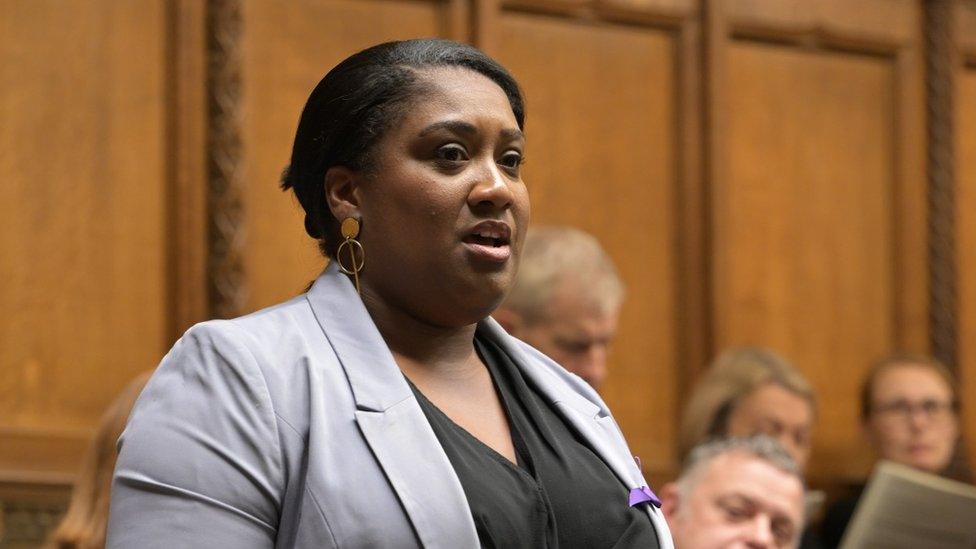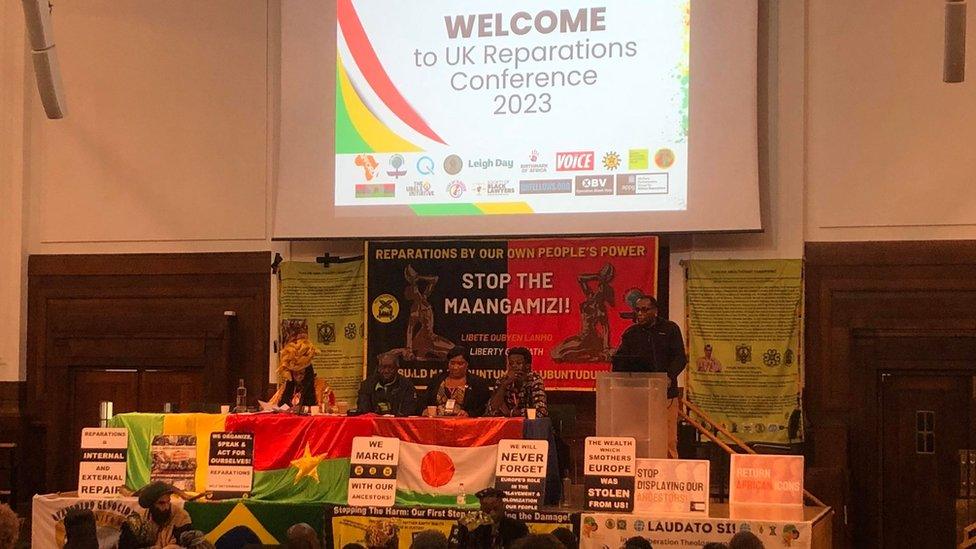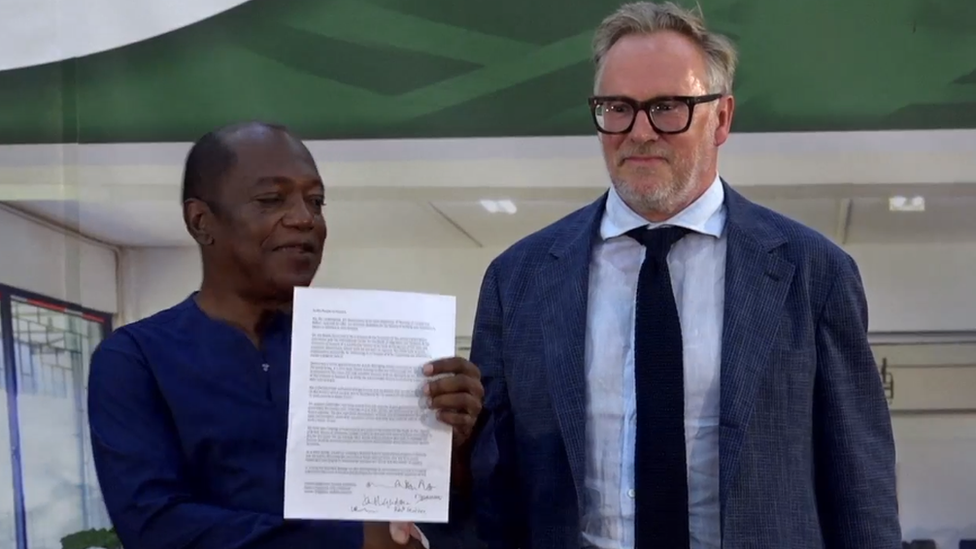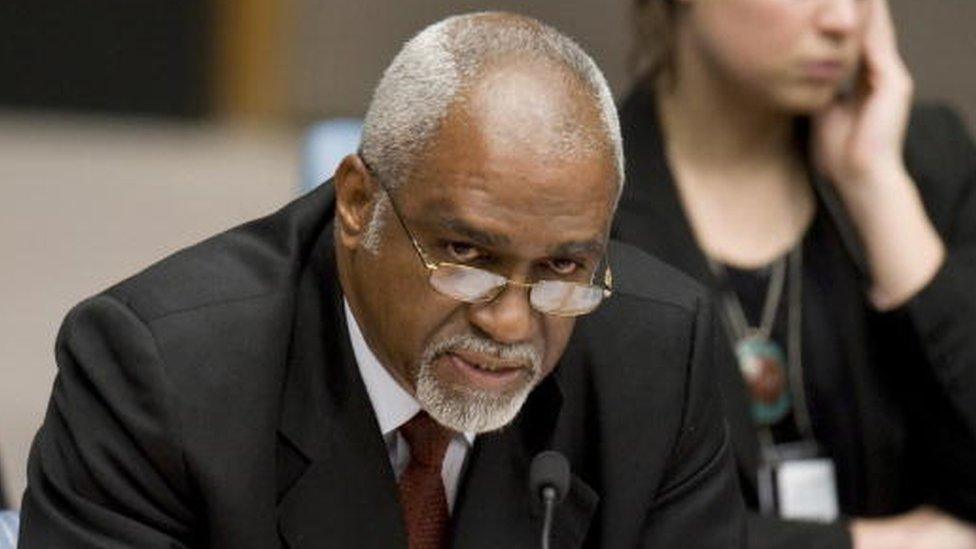Slavery apology should be Labour policy, MPs say
- Published

Labour MP Bell Ribeiro-Addy is the chair of the All-Party Parliamentary Group for Afrikan Reparations
Labour should issue a formal apology for the UK's role in transatlantic slavery if it wins power, left-wing MPs have said.
The party said Sir Tony Blair had already said "sorry for the wrongs of slavery" when he was prime minister.
A Labour spokesperson said the party was clear the slave trade was "wrong".
But Bell Ribeiro-Addy and other backbench Labour MPs would like to see their party go further should it win next year's general election.
They say the British government has never officially apologised for its participation in the slave trade.
They want the UK to emulate what other European governments have done, such as the Dutch state, whose prime minister formally apologised at a ceremony and pledged millions of euros to slavery awareness projects in 2022.
Prime Minister Rishi Sunak has rejected the idea and said "trying to unpick our history is not the right way forward".
But Ms Ribeiro-Addy told the BBC "I don't believe he's going to be the prime minister for much longer".
"So we look towards a new party in government and what they might do," said Ms Ribeiro-Addy, a former shadow immigration minister under left-wing Labour leader Jeremy Corbyn.
With Labour enjoying a large lead in the opinion polls, and a general election expected next year, the party is gearing up for a return to government after 13 years in opposition.
The call for reparations over the country's involvement in slavery is not on Labour's agenda as the party focuses on its five "missions for Britain".
It is not Labour Party policy to introduce reparations.
Making amends
Reparatory justice can take many forms, such as an apology and sometimes compensation for something that was deemed wrong or unfair.
Sir Tony expressed "deep sorrow" for slavery when he was prime minister in 2006.
A year later, when asked why he had previously stopped short of apologising during a news conference with Ghana's then-President John Kufuor, Sir Tony said: "Well actually I have said it: We are sorry. And I say it again now."
"Tony Blair was right to say sorry for the wrongs of slavery as prime minister in 2007," a Labour spokesperson said. "Labour is clear that Britain's slave trade was entirely wrong and must be condemned."
But Ms Ribeiro-Addy - who's a member of Labour's left-wing Socialist Campaign Group - thinks the matter should be revisited by her party.
Ms Ribeiro-Addy chairs the All-Party Parliamentary Group for Afrikan Reparations (APPG-AR), a group of cross-party MPs which hosted its first reparations conference in London over the weekend.
In its closing statement, the conference called on national governments "that profited from forced enslavement" to "acknowledge the responsibility they have to repair the lasting damage and engage in meaningful dialogue on how to begin the process of reparatory justice".
Is Labour leader Sir Keir Starmer receptive?
"I think like any leader, he will be receptive to what the demands of the public are," Ms Ribeiro-Addy said.
She argued there had been more support and momentum behind the reparations movement in recent years, pointing to the efforts of some European governments and individual families to make amends.
"I would like it to be Labour Party policy in the first instance that we will apologise officially and accept what happened," Ms Ribeiro-Addy said.
"And not what Tony Blair did, not expressing deep regret, as we've seen heads of state do. An apology, an acceptance of responsibility for what has happened."
Mixed views
Labour MP Clive Lewis said he would like to see his party adopt an apology as official policy, at some point in the future.
But for that policy to be effective, he said, there first needed to be a "national conversation" involving those affected by the legacies of slavery and "recommendations that have public buy in".
One option, he suggested, could be a Royal Commission that looked into the issue of reparatory justice and made recommendations.

A group of cross-party MPs held its first conference on reparations over the weekend
For now, reparations remains a fringe issue in the Labour Party, and there are mixed views among MPs from all parties on how to deal with the legacy of slavery at home and abroad.
Britain passed crucial laws to abolish the slave trade in 1807, and then slavery in most parts of the British Empire in 1833.
This year, Caribbean leaders, activists and the descendants of slave owners have been putting the UK government under increasing pressure to engage with the reparations movement.
But Mr Sunak's government has been clear: it has no plans to pay reparations.
Earlier this year, Foreign Minister David Rutley set out the government's position.
He said the government believed "the most effective way for the UK to respond to the cruelty of the past is to ensure that current and future generations do not forget what happened, that we address racism, and that we continue to work together to tackle today's challenges".
Related topics
- Published26 April 2023

- Published24 September 2023

- Published23 August 2023
